|
"You're keeping in step
In the line
Got your chin held high and you feel just fine
Because you do
What you're told
But inside your heart it is black and it's hollow and it's cold..."
1. College House
If.... The question without a question mark becomes a statement. It yearns for an answer. It's not even a single ellipsis... There's an added full stop, like a challenge. If... Full Stop. A statement, a wish, an inevitability. Well that's what it was when I was the same age as its protagonist, Mick Travis, the last time I saw this glorious "Fuck you," of a movie. It's like someone pushed all the episodes of The Prisoner into a blender and out poured this dark, distilled epic allegorical poem. Realism – and by extension kitchen sinkism – is for those who are aiming high but not high enough. Freedom for all and boy, did these uptight, establishment bastards deserve a bullet. OK, OK, there's a knee jerk reaction and simply a jerk reaction. Boo hoo.
The establishment (that which is established as twisted as that has become over centuries of tradition) creates an obnoxious class of masters and prefects within a generic English boarding school. They treat underlings like scum and potential homosexual partners. Under the school roof, the only women are masters' wives and matrons, in turn de-sexualised by their status. There are enough reasons here to go postal. The real shocker would have been Travis (our hero/anti-hero) doing absolutely nothing except forgiving the lot of them but Travis isn't Christ, he's "Oh, Jesus Christ..."
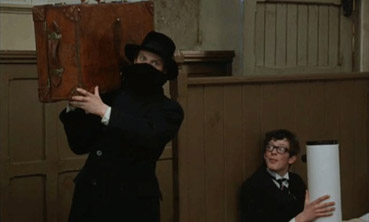
If....'s narrative is straightforward even if its meanings are anything but. In an unnamed English boarding school in the sixties, it's business as usual. Prefects consort with the staff to make their underlings as miserable as possible. They beat students with canes and pass sleazy eyes over the current crop of new boys, potential for homosexual conquest and domination. Three boys rebel led by Mick Travis played by Malcolm McDowell in his first film role. Interspersed in the narrative are surrealist flashes and no explanations – just as it should be. After apparently killing one of the sadistic clergy teachers, Travis and his band (now enlarged to five through the joining of Phillips, Wallace's first year lover and Christine Noonan, Travis' girl from a roadside café) unearth weapons and go on a rampage.
In 1968, no one had any reason to regard Columbine as anything but another sleepy mid-west American town back then.
2. College
"Just how deep do you believe?
Will you bite the hand that feeds?
Will you chew until it bleeds?
Can you get up off your knees?
Are you brave enough to see?
Do you want to change it?"
In February of 1968, McGoohan's final Prisoner episode 'Fall Out' was broadcast. Is it too much against prevailing wisdom to suggest that screenwriters David Sherwin and John Howlett were influenced by McGoohan's last gasp at closure? The similarities are marked (funny how everything ends with machine guns). It's just that this period in history (the late 60s) seemed to be both a glorious golden age for TV and Film. Rebels were hip and we needed rebels. Everything seemed to fit. How the late 60s gave birth to the 70s is utterly beyond me. What an hysterical pregnancy that was.
If.... is more layered than a two storey lasagne. Lindsay Anderson made his name as a politically active, defiantly left wing intellectual who directed plays, wrote articles and critiques. There was no way this maverick was going to make a film that wouldn't provoke controversy. Gavin Millar, (ex-critic, present drama director) said that the sides were drawn but whom did we (an audience) identify with? He had a good point. Were we the nasty power wielding bastards with sticks who beat up people for (a) getting under our skin and (b) having simply an unacceptable attitude or were we the trio of crusaders, those who, if they found a cache of weapons and ammunition, would gleefully murder people in the name of freedom? Well, of course, depending on one's age and experience, you will chose accordingly or if you see this as an allegory (what else when dead clergy turn up in massive wooden drawers to shake hands with their murderers?) then the field is wide, wide open. Identify, don't identify. Just lap up the layers.
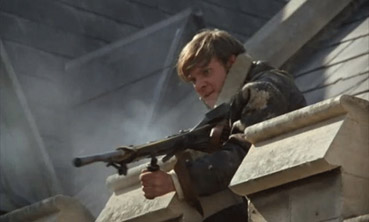
Is it necessary to identify with anyone to use the oft-repeated mantra of Hollywood and its onslaught of audience gloop-friendly market research? I submit that it isn't. The powerful and the subdued are the thesis and antithesis of freedom. Logic dictates that freedom is a desirable construct but like McGoohan's No. 6 situation, enclosed in the world of the Village, freedom is not quantifiable like a brick or sugar in coffee. It's an intellectual rationalisation of how much you observe and allow the prevailing powers to 'mess with you' to slip back into Joss Whedon-speak. In the U.K. we have our freedoms, freedom to turn right down the high street, freedom to buy a newspaper, freedom to protest against decisions from on high. We are afforded the illusion of freedom in choosing our leaders whereas this theatrical so named democratic mockery of same is now just another television programme. The PM Factor.
3. Term Time
"What if this whole crusade's
A charade
And behind it all there's a price to be paid
For the blood
On which we dine
Justified in the name of the holy and the divine,"
Back in the 60s, anarchists had something to get their teeth into, dried jerky establishment figures, traditions hundreds of years old that yielded only to the sharpest bite – or pretended to yield before crushing opposition under a determinedly faux-hobnail boot. England had a lot of practise in preserving the foundations upon which she was built. Some adolescent oik in a bomber jacket is hardly going to bring down society. But he does have an automatic weapon. And as long as so called 'realism' is left at the box office door, as Whedon once said, "Bring your own subtext..."
If.... is a treatise on the human condition and how that condition is railroaded into a rut of conformity. Nothing like the twin pillars of school and church to bring you in line. On the flip-side, If.... is every kid's dream. It's not the violence per se, it's the power or the "Fuck you!" regardless of your perceived power to rip my buttocks into sixteen strips. Travis' has a core of oft quoted revolutionary lines: "There's no such thing as a wrong war. Violence and revolution are the only pure acts." And "One man can change the world with a bullet in the right place." Between the headmaster's eyes may not be the location to bring about the pure solution that Travis seems to be seeking. But then Travis isn't real but rebellion distilled into the romantic. He's the blue eyed poster boy for every school child who's been bullied or suffered an injustice.
4. Ritual and Romance
"Just how deep do you believe?
Will you bite the hand that feeds?
Will you chew until it bleeds?
Can you get up off your knees?
Are you brave enough to see?
Do you want to change it?"
You don't have to travel too far into If.... to get to the wish fulfillment fantasies and it's all achieved with such economy it feels like this section of the film has been squeezed until its pips yelped. Travis and Johnny steal a motorbike and zoom free to a roadside café where Travis (the envy of every stuttering schoolboy) steals a kiss and gets a slap (in the audition it was a fist apparently but then boys would take a lot from Christian Noonan. If she'd aimed right at least she was paying you some attention). This savage cat duel in which the two indulge climaxes in several seconds of naked cavorting (my introduction to cinematic sex however brief). Fully clothed she walks back to Johnny and then we get that cut – sandwiched between the two boys standing on the motorcycle, Noonan stands, arms open, the personification of 'free spirit'. Time to pay for daring to live.

Romance in the movie is inevitably heavily weighted towards the boy to boy. There is a sublime scene shot in slow motion of Phillips (the first year, impossibly Seraphic with a fringe often scooped away from his eyes accompanied by a pout that – I venture cautiously – gay men would find hard to resist). He's putting on a sweater while mesmerized by Richard Warwick as Wallace (one of the trio) on the parallel bars. There is also a cut to die for here, as the lithe, athletic body reaches a point at which he must come down to earth just as we cut to Phillips pulling his pullover down over his head. It's absolutely sublime. The whole short scene's about as effective a seduction I think I've seen on film and it's different because it is the naïf showing feelings for the more experienced student. In this instance, Phillips becomes pro-active in the understated affair. And believe me, it's understated. Asleep in Wallace's arms, the film-makers just about get away with it.
Before this review gets too unwieldy, let me just mention Anderson regular Arthur Lowe who is a delight in If.... He plays a house-master who is utterly under the thumbs of both the whips (Anderson's Prefects) and his wife whose steely silence adds power to her surreal and naked walk through the boys' dorm. Lowe (especially in single shots where it feels as if he doesn't know he's being filmed) is almost a traitor to the perception of his class. This is no Captain Mainwaring, bank manager and stalwart of the Home Guard. This is a man who knows the art of subverting expectation.
5. Discipline
"So naive
I keep holding on to what I want to believe
I can see
But I keep holding on and on and on and on
Will you bite the hand that feeds you?
Will you stay down on your knees?" |
Nine Inch Nails' 'The Hand That Feeds'
(just in case you really wanted to know) |
Authoritarian retribution is swift and alarmingly cruel. Of course, the boys are not punished for their actions but their attitude. The top shot of the three waiting for their turn just outside the gymnasium is extraordinary in that it is a single shot lasting 3 minutes and 10 seconds (4% longer @ 24fps in the cinema, naturally). The cast have singled that shot out for attention with McDowell stating it lasts 6 to 7 minutes but we'll forgive the exaggeration. And curiously, the scene was completely improvised by the three boys. The will is the last nugget to be popped from resisting souls and after his physical thrashing, Travis denies his persecutors that satisfaction wiping away a tear of pain which Anderson (sublimely) covers from behind. It's a wonderful moment of directorial choice seeming wrong but ending up in context being absolutely right.
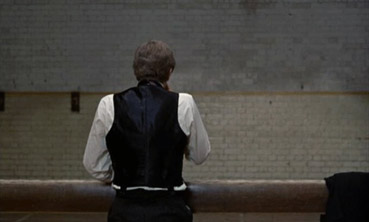
As an artist, Anderson has bitten Paramount's hand hard and we've not even got to the catharsis...
6. Resistance, 7. Forth To War & 8. Crusaders
The last 20 minutes of If.... have passed into British Film lore. This was wish fulfilment on a nihilism scale of 9.9. Notice in the battle it's only the establishment that sustains losses and that our five rebels go out fighting but never get shot down despite the firestorm aimed at them. Of course we cannot follow through on the consequences of their actions – allegories get to sit those repercussions out, lucky allegories. But a final personal word:
This movie did more to convince me that no child of mine would ever go anywhere near a boarding school. Things change. Traditions soften, the sharpness of things dulls over time. And to my surprise – from partner enthusiasm and encouragement – I watched as my son embraced boarding school and is having a great time.
Every weekend I sneak a live round into his shoulder bag... Just don't trust the headmaster... Full Stop.
The film is presented as 1.85:1 anamorphic with a dependable if a tad hissy Dolby Digital mono soundtrack. The print is in remarkably good condition given the age of the movie (my god, it's almost 40 years old). The contrast is solid and inevitably when we go from black and white to colour, the punch is quite visceral. There is very little sparkle and dust but in the black and white scenes the grain is slightly more noticeable than in the colour sequences. Colours are vibrant but I would have tweaked the contrast on the black and white shots, made the blacks a little more rich. The print is sharp if not pin sharp and has the 'film' feel which produces a softer edge, not surprising as it was shot on film.
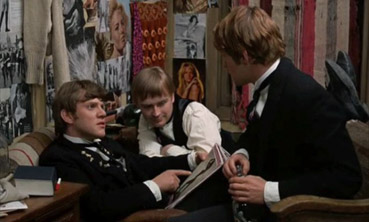
There are English subtitles (and English for the hearing impaired) for the movie and the movie's commentary, just the English. There are no foreign subtitles.
Feature Commentary: Star, Malcolm McDowell and film critic and historian David Robinson (as a critic he was present at some of the filming of the movie)
This is a very good, informative and solid commentary. The 50-50 division between Robinson's and McDowell's contributions seems almost as if it must have been a cut and paste job but a few remarks tell you that the two men are there at the recording at the same time watching the movie. The fact it almost feels scripted is, in this case, a compliment. Robinson quotes "Intuition, pattern and convenience..." Lindsay Anderson's definitive answer on the arbitrary choices of one of the movies' most long standing arguments. Colour or black and white? And why? Let that be a final (three) word until the next time I bring it up.
McDowell – at 24 years of age, in his first film role – was quite happy for actress Christine Noonan to briefly appear wholly naked. But when it came to his own penis, Anderson apparently said "Help yourself!" and allowed McDowell to edit the one shot as it appears. He had no such qualms acting naked as a Frankenstein's monster in Britannia Hospital.
From recollection, Anderson comes across as a fascinating iconoclast with a withering opinion of those he saw beneath him (that would be all of us). He even directed McDowell on A Clockwork Orange, or rather before shooting (but no one told Stanley). But his talent and his unique position (he was sexually unreadable – assumed gay – read the Telegraph but was a committed anarchist) within the establishment and played up to this by taking acting roles that affirmed this lofty status and conveniently sloughing off his political intent. Like Chris Morris, even iconoclasts have to eat.
Thursday's Children (22:38)
This is a black and white Oscar winning short in 4:3 (check out the BBFC's certificate, takes me right back) about a group of deaf children from Margate. Richard Burton – working for nothing, it's noted – provides the commentary and it's a caring and concerned look at (in my day in school certainly) the outcasts due simply to the fact they could not hear.
Cast and Crew (42:07)
Kirsty Wark reunites a few key members of If....'s crew on the late night Open University BBC show. It's a solid glimpse as a retrospective piece but I wish Kirsty could have spoken to Czech cinematographer Miroslav Ondricek a little more quietly. His English (subtitled) is difficult enough without Ms. Wark really over-doing the questions. On second thoughts, he cups his ear a lot. Maybe he really is hard of hearing. Nice to see Stephen Frears (yes, the Stephen Frears) remembering his role of assistant director. The black and white and colour issue is brought up again. This time the producer tells us that the production had no money for the number of brutes (huge lights) to light the church properly so it was shot in black and white requiring fewer lights. While the producer Michael Medwin staunchly defends the monetary reason, assistant editor Ian Rakoff defends Anderson's subsequent shooting of other scenes and sometimes single shots in black and white as part of the underlying philosophy and deliberate ambivalence of the movie. This certainly fits...
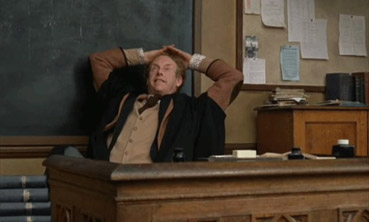
Interview Graham Crowden (14:38)
Crowden's only in the movie for about one scene and three shots but his stature gains in nature as Professor Millar turns up in the unofficial 'other two of the trilogy', O Lucky Man and Britannia Hospital. Crowden talks about meeting Anderson, a few faux pas(s) (what's the plural of 'faux pas'?) and the fact that as a director Anderson listened to ideas regardless of their origin. It's nice to know how many classic moments in If.... were actors' suggestions and not just the director's ideas. It's an entertaining memoir. What is so touching is to realise just how sensitive and insecure our very own Dr. Jock McCannon (from the sublime TV series A Very Peculiar Practice) actually is. Sweet. There is a curious title at the end of the credits of this interview – © 2007 The Criterion Collection. Is the hallowed LD and DVD restoration company sub-letting their extras now? Odd.
Physical Extras
5 x Postcards (four scenes from the movie and the other the grenade version poster). There is no inlay card or booklet.
If.... Is a classic British movie with so much more on its mind and heart than a simple reading. This review would be the crunchy skin on the pig carcass. See it for the full flavour and bite down hard. You'll be rewarded.
In a side piece, Brutes in the Chapel, Camus talks to the film's camera operator and now acclaimed director and cinematographer Chris Menges to put the record straight on the colour/black and white issue. Click here to read the article.
|